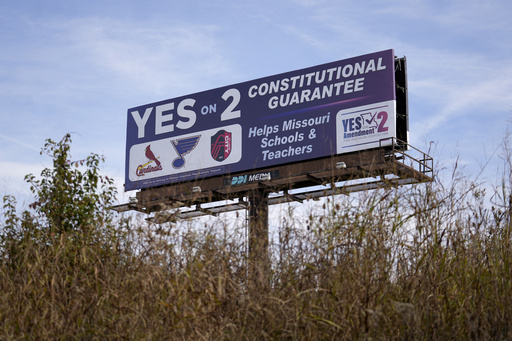
In Jefferson City, Missouri, a ballot initiative aimed at legalizing sports betting has garnered attention, particularly for its promise of generating significant new tax revenues for educational institutions. If voters approve this measure, they can anticipate an influx of advertisements promoting enticing deals for bettors. However, many of these promotional expenses, such as cash-like credits provided by sportsbooks for placing bets, will likely be exempt from state tax obligations. This exemption could dampen the anticipated financial support for educational funding.
The discourse surrounding the Missouri ballot measure brings to light a broader conversation among lawmakers about how best to tax the burgeoning sports betting industry. This sector has rapidly evolved since the U.S. Supreme Court legalized sports wagering across states in 2018, moving from just Nevada to encompassing 38 states and Washington, D.C. “It’s a fledgling industry,” remarked Brent Evans, an assistant professor in finance who specializes in gambling-related topics. “So nobody really knows what constitutes a fair tax rate.”
Several states, including Illinois, Ohio, Tennessee, and Washington, D.C., have already made adjustments to their tax rates following the authorization of sports betting. States such as Colorado and Virginia have also tightened their initial deductions. Tax rates vary widely, with some states, like Iowa, imposing a mere 6.75% tax, while others, like New York, set their rates as high as 51%. The disparity is further highlighted by fiscal policies regarding promotional bets: Iowa permits these promotional costs to be deducted from taxable revenue, while New York does not.
Around half of U.S. states allow deductions on promotional costs to attract bettors, which though beneficial for initial engagement, ultimately reduces the immediate tax revenues available for state allocations. Missouri’s suggested 10% tax rate on sports betting falls below the national average of approximately 19% reported last year. Thanks to allowances for “free play,” there may be instances where sportsbooks net zero tax liability, a situation acknowledged in the amendment which permits carryover of negative balances until enough revenue accumulates to incur tax obligations.
Missouri’s proposed amendment sets a cap on the deductible promotional credits at 25% of total wagers—though it’s unlikely this ceiling will be reached. Projections from the consulting firm Eilers & Krejcik Gaming indicate that in the first year of sports betting in Missouri, promotional bets may constitute only about 8% of total wagers, with a subsequent decline expected.
According to Jack Cardetti, a representative for Winning for Missouri Education, the amendment aligns closely with successful frameworks seen in other states. For instance, Colorado rolled out sports betting in 2020 with a 10% tax rate and comprehensive deductions for promotional betting. Despite a promising first year with total wagers reaching $2.7 billion and yielding $8.1 million in tax revenue—slightly shy of initial forecasts—Colorado revised its law in 2023 to constrain promotional deductions progressively, eventually capping them at 1.75% by 2026. This adjustment has corresponded with a significant increase in tax revenue, surpassing $30 million in the latest fiscal reports.
Capping deductions available for promotional bets is seen as a constructive approach, as noted by Richard Auxier from the Tax Policy Center. However, he raises the question of the rationale behind tax exemptions for these promotions, drawing a parallel with cannabis regulations where free samples are not provided to encourage usage. Missouri’s amendment, which appeared on the upcoming November ballot via an initiative petition due to stalled legislative efforts, has been notably funded through a $43 million campaign primarily backed by sportsbooks DraftKings and FanDuel. If successful, these companies would obtain the opportunity to apply for statewide licenses for digital sports betting, along with new licenses for casinos and professional sports teams.
Contrarily, Caesars Entertainment, which manages three casinos in Missouri, has backed a $14 million opposition campaign, expressing that while they generally support sports betting, they disapprove of the current wording of the proposal. Complicating the betting landscape, research shows that as online sports betting grows, revenue from traditional casino gambling may decline.
State tax rate disparities illustrate varied outcomes as seen in Illinois and New Jersey—two states at the forefront of advancing legal sports betting. In the previous year, both states witnessed sports bets totaling between $11.5 billion and $12 billion, generating around $1 billion in revenue for sportsbooks. New Jersey collected $129 million in tax revenue under a dual tax structure that included a 14.25% rate for online betting, while Illinois generated $162 million under a 15% rate overall.
Despite initial tax revenues, Illinois officials sought to implement a progressive tax scheme, initiating a 20% tax on revenue below $30 million, escalating to 40% for revenue exceeding $200 million. Though sportsbooks had threatened to withdraw their services in response to rising rates, such exits have not materialized, showing the competitive nature of the industry. Joe Weinert of Spectrum Gaming Group remarked that there is little evidence suggesting sportsbooks undercut wager odds in states with elevated tax rates, affirming that the operators remain compelling players by offering competitive odds and attractive promotions to draw in bettors.
